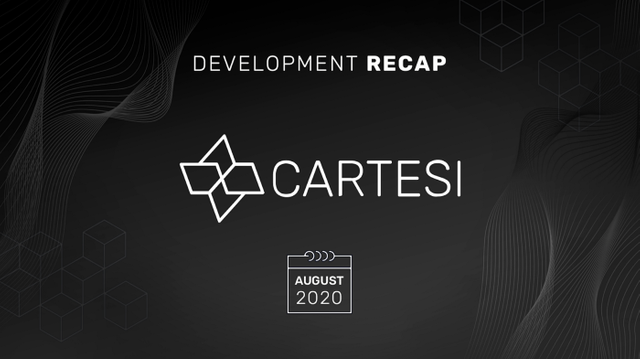
Over the past month, the team made significant progress on our infrastructure and upcoming Proof of Stake prototype, along with continuous improvements and releases on our Descartes SDK.
Descartes SDK 0.2.0
The Cartesi team is released a brand new release of the Descartes SDK. This new 0.2.0 version builds upon the capabilities of the previous 0.1.1 release, adding some new features and removing some of the past limitations.
Previously, the simplest usage of the Descartes API to instantiate a computation limited the user to very small sizes for its input and output data, only allowing 32 bytes for each one. This restriction has been lifted, and now data of any size can be directly used in the API, bounded only by the current limits of the Ethereum network itself.
With these new capabilities, the accompanying documentation has been incremented with a series of new powerful yet easy to use examples. With a simple smart contract and often just a single line of off-chain code, the user will be able to explore a plethora of new possibilities, such as calculating arbitrary complex mathematical expressions or running any script using Python, Lua, or another interpreter of choice. On top of that, it is now shown how the Descartes SDK can be easily used by smart contracts to solve some complex real use cases, such as verifying the signature of documents using GPG or validating block headers for Litecoin and Dogecoin using scrypt.
Infrastructural Progress
Aside from the new SDK features and tutorials, the team is currently working on several aspects of the infrastructure. Here is a summary:
- Good progress with the development of the lottery and PoS system. We will release more information as we get closer to releasing it on Testnet;
- Important redesign definitions and implementations regarding the relationship between Cartesi nodes and DApp users they represent;
- IPFS is being integrated to allow for Descartes nodes to become DApp agnostic. Nodes can receive the configuration and Cartesi Machine templates required to run a DApp when they become associated with the nodes;
- IPFS is also being integrated to allow Descartes Nodes to receive input data from DApp clients. With that, nodes have access to a decentralized sharing of data and a way to present the data to the Logger (for on-chain persistence) in case of disputes, ensuring data availability;
- Other significant advances with the Cartesi Machine and the Dispatcher components of the Descartes Node;
- The team has also continued its working on the cloud infrastructure that will give convenience to the users of Cartesi DApps. More on this at a later article.
We highly encourage any developer willing to use or collaborate with Cartesi to contact us on Discord. We will be more than happy to offer you guidance.
Important Links
Website: https://cartesi.io
Twitter: https://twitter.com/cartesiproject
Telegram: https://t.me/cartesiproject
Discord: https://discordapp.com/invite/Pt2NrnS
GitHub: https://github.com/cartesi